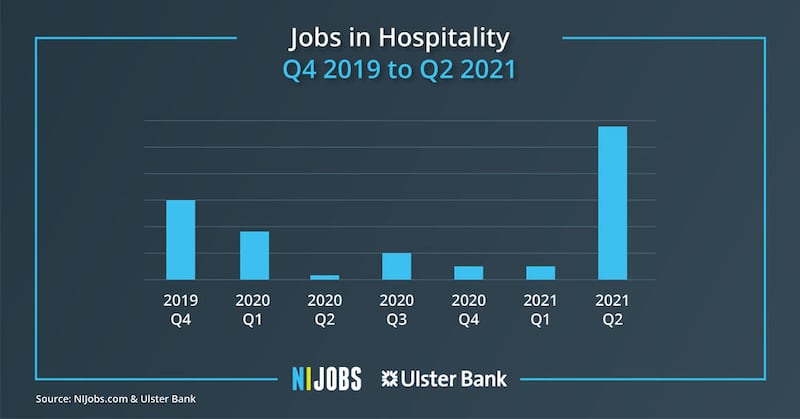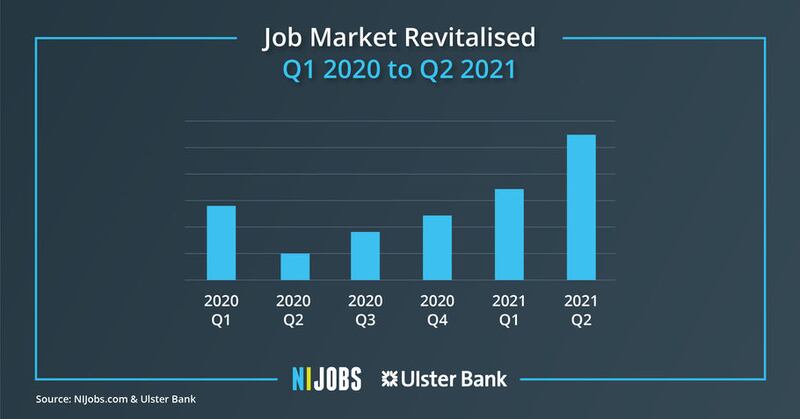THE easing of Covid-19 restrictions saw job listings in the north surge by 57 per cent in the last quarter, but many employers are struggling to fill vacancies due to the impact of Brexit and Covid-19.
New labour market analysis from NIJobs.com revealed that the reopening of indoor hospitality resulted in an elevenfold rise in advertised roles across the sector during April and June.
The recruitment website said more jobs were advertised in the first six months of 2021 than in the whole of 2020.
But the traditional source of EU labour has been diminished post-Brexit. Record numbers of workers are also rethinking their careers post-lockdown, a global phenomenon that has been coined ‘The Great Resignation’.
NIJobs.com reported 27 of its 31 employment categories saw increased job listings in the second quarter, with 60 per cent of those categories recording their highest number of vacancies to date.
The recruitment website said it was the sectors hardest hit by the recent lockdowns that reported the sharpest increase in advertised jobs.
Hospitality vacancies rocketed by 1,008 per cent between the first and second quarters, with applications in the lead up to the reopening of indoor dining on May 24 increasing eightfold compared with the same period last year.
‘Retailing, wholesaling and purchasing’ shot up by 268 per cent in the second quarter, while there was also a marked increase in beauty, hair and leisure roles, with listings up 150 per cent.

General manager at NIJobs.com, Sam McIlveen said the demand for hospitality staff in particular had put immense pressure on businesses.
“They are battling a number of factors to fill roles including skills shortages, staff retention and general misconceptions associated with the industry-such as low pay and being viewed as a stop-gap or short-term career option,” he said.
“It’s worth bearing in mind that what hospitality is currently experiencing is unprecedented in recruitment.
“An entire industry has never started from such a low base to hire the same talent at the same time.
“Also, as a result of Covid and Brexit, many skilled and experienced workers left the industry to seek out new employment while others, from outside the UK, decided to return home, leaving gaps that are proving challenging to overcome.”

He said the onus may now fall on recruiters to develop long-term training and development opportunities within the sector, alongside competitive salaries, to attract and retain future employees.
Ulster Bank’s chief economist Richard Ramsey said while the scale of the demand for roles across a broad range of sectors was an encouraging sign for the economic recovery, he said filling those positions is proving a challenge.
“Skills shortages are prevalent across the length and breadth of the economy.
“Prior to Brexit, the EU was a key source of labour that plugged skills shortages in a variety of occupations and sectors,” he said.
“But UK firms can no longer tap this resource in the way they once did. Skills shortages are likely to be accompanied by significant pay rises.
“This is just one of many costs for business that are rising at much faster rates than they would like.”

A recent study from Microsoft suggested around 40 per cent of the global workforce could be set to resign at some point this year.
Just under 40 per cent of UK and Irish workers say they will do the same this year or when the economy is stronger.
“This is around double what it would typically be,” said Mr Ramsey. “The next 12 months are likely to see an unusually high level of staff turnover as firms and individuals adapt to the post-Covid world.
“We have already started to see this in the latest NIJobs.com jobs report.”








